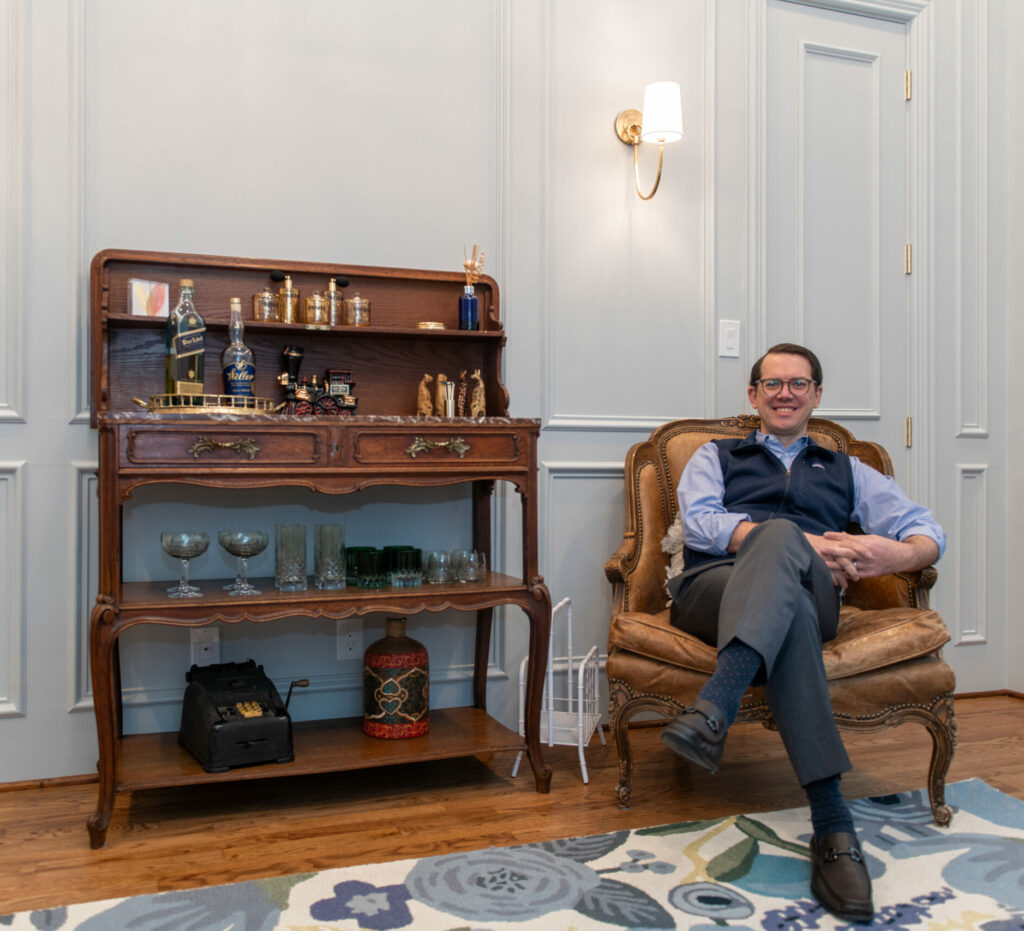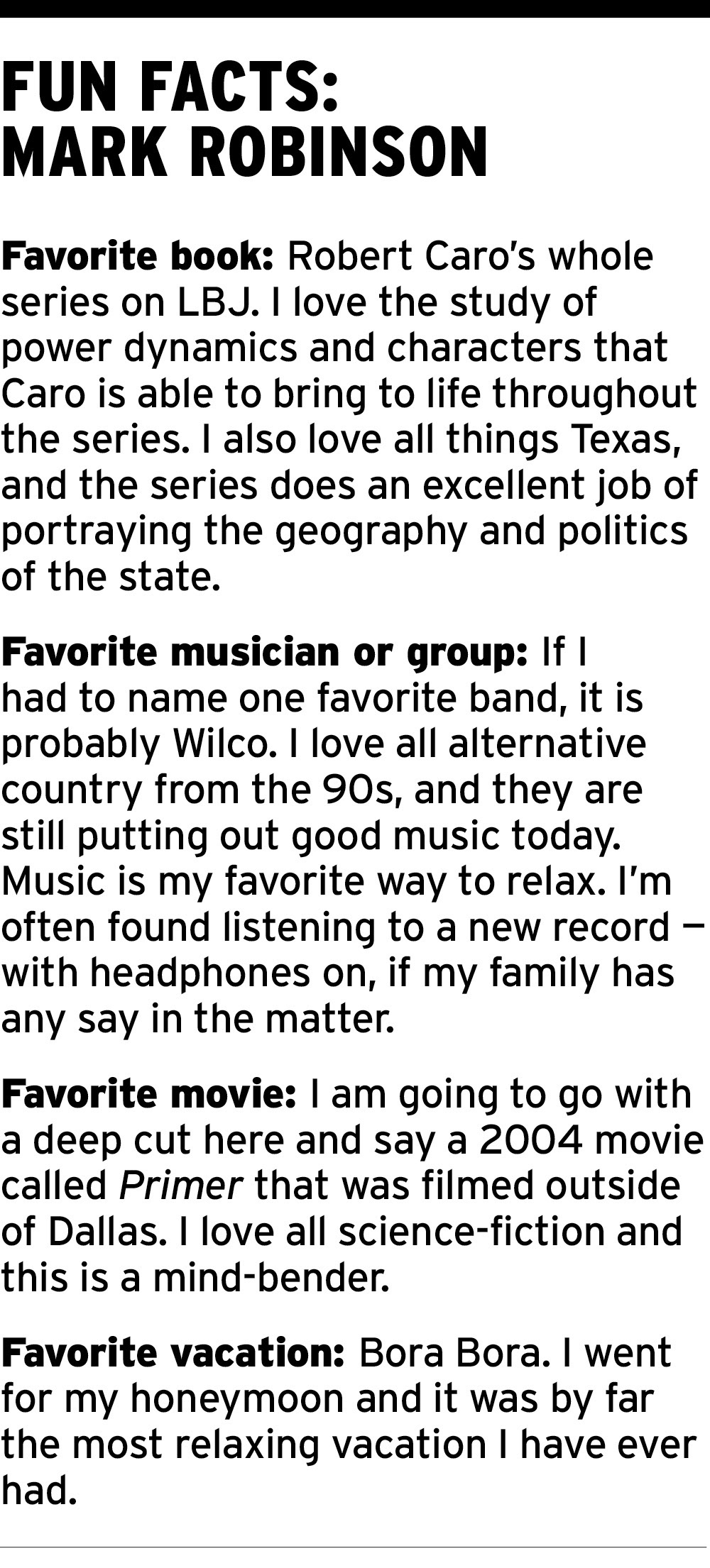
When Mark Robinson joined GameStop in 2015, the Grapevine-based gaming retailer had $9.3 billion in revenues and a market cap of $4.9 billion.
Robinson had been a partner at two global law firms practicing corporate finance for a dozen years, but at GameStop he was an absolute generalist. There were garden-variety contracts to draft, basic commercial disputes to argue and litigate, leases to review and employment issues to resolve.
“Routine lawyer stuff,” Robinson said.
All that changed in 2020 and has continued changing ever since.
There was the Covid pandemic in 2020, which exacerbated steep declines in retail brick-and-mortar operations as video game sales shifted to cyberspace. In 2021, GameStop became the poster child for meme stocks and witnessed its stock — for reasons not explained by standard methods of valuation — soar 1,500 percent. That year, the company promoted Robinson to general counsel.
During the past 18 months, Robinson successes have been even more extraordinary, including:
- He navigated the company through complex regulatory issues related to the new NFT marketplace and digital assets business;
- He guided GameStop through a rise in commercial disputes — most notably the company’s defense of a high-profile $30 million lawsuit over fees brought by Boston Consulting Group;
- He oversaw numerous vendor negotiations and cost-cutting initiatives;
- And most importantly, he was temporarily appointed GameStop’s principal executive officer for three months when the company’s board fired its CEO, during which he helped drive a $100 million year-over-year improvement in net income through cost-cutting and margin-improvement initiatives.
“Mark Robinson had an exceptional year guiding GameStop through a particularly challenging period,” said Angela Zambrano, co-lead partner of Sidley Austin’s Dallas office. “Mark has guided the company through the ongoing ramifications of the ‘meme stock’ phenomenon and the company’s significant role in it, including a short-squeeze, a complete turnover of the company’s board of directors and senior management, an SEC inquiry and multiple capital raises.”
“Mark’s successful juggling of multiple responsibilities and challenges during this period was essential to stabilizing GameStop and leaving the company in a stronger position,” Zambrano said, who notes that Robinson has worked for seven different CEOs in his eight years at GameStop.
The Association of Corporate Counsel’s DFW Chapter and The Texas Lawbook name Robinson the recipient of the 2023 DFW Corporate Counsel Award for General Counsel of the Year for a Small Legal Department.
Robinson and other winners of the 2023 DFW Corporate Counsel Awards will be celebrated Jan. 25 at a ceremony at the George W. Bush Institute.

In an interview with The Lawbook, Robinson said the meme stock and short-squeeze activity that made GameStop the focus of daily attention by CNBC and the financial news media only minimally impacted how he did his job as general counsel.
“Not as much as people sometimes think,” he said. “We were bystanders through it all. In 2021, our share price significantly increased and that caused several unique challenges. However, being a ‘very public’ company has not significantly changed the fundamentals of our business. We still offer gaming and entertainment products.
“I will say that the movie Dumb Money, which is based, in part, on the GameStop story, wanted to film in our stores,” he said. “I was involved in that process — reading a movie script was something I never expected to cross my desk.”
The movie stars Pete Davidson, Seth Rogan and Vincent D’Onofrio. D’Onofrio, who has starred in movies like Full Metal Jacket and T.V. programs like Law & Order Special Victims Unit, plays hedge fund titan and now New York Mets owner Steve Cohen, who walks around with a pig as a pet. Be warned: This may be the only movie in which Rogan, who also plays a hedge fund manager, does not play someone high on weed. Rogan plays Melvin Capital hedge fund founder Gabe Plotkin, who lost billions short-selling GameStop in 2021.
“Producers were looking for the rights to use GameStop’s name and our stores as part of the film,” Robinson said. “I wanted to understand the nature of what they were doing. Reviewing the script was an interesting process.”
Lawyers who work with Robinson say that he remains steady and plans ahead even during periods of crisis.
“Mark has been instrumental in navigating tumultuous leadership changes over the last five years,” said Trey Cox, co-managing partner of Gibson Dunn’s Dallas office. “Mark has risen to the occasion through the perils of Covid store closures and stock market frenzy. He has helped steer the company through tough regulatory environments and significant changes in business strategy. Through all of it, Mark has proven he is instrumental to the overall leadership of the business.”
“Mark has great instincts for seeing around corners, seeing how legal challenges will unfold,” Cox said. “Part of that comes from strong, ethical principles that he’s able to combine with practical, business-minded decision making. He uses those instincts to create the right teams of experts, who he empowers to creatively solve problems. He holds his teams accountable for high performance while giving them freedom and flexibility to achieve results in the best way possible.”
Robinson oversees a legal department that includes three other lawyers and two paralegals, which is a small staff for a public company and global retailer with about 4,500 stores and about 30,000 employees.
Robinson’s guiding principle, according to Weil Gotshal partner Benton Lewis, “is to get the job done and get it done most efficiently for the company.”
“Mark is not hesitant to roll up his sleeves to do work that others would think is beneath them,” Lewis said. “Mark is a true leader who is not limited by his title. He can easily be the chief operating officer or chief executive officer of a major public company one day soon.”
“I hope one day that Mark will be able to tell us all that went on behind the scenes during all of the craziness,” Lewis said.
Robinson was born in Dallas. His family moved around Texas a bit when he was growing up before settling in Coppell in about 1987.
“Coppell was a much different place back then,” he said. “A sleepy 3A town with two main roads.”
Robinson’s mother was a teacher and school administrator. His father was a pastor who later became a paralegal for Jones Day before working as an administrator in Dell’s legal department in the early 1990’s.

“I had exposure to both Big Law and in-house legal from him,” he said. “Dad had many interesting stories about his experiences related to the Diamond Shamrock and [the] Ivan Boesky insider trading matter at Jones Day and then later about the growth at Dell, which got me interested in becoming an attorney.”
Robinson earned his bachelor’s degree in economics from the University of Texas in 2000.
“I always enjoyed risk assessment and negotiation, and the experience of my father convinced me that it was a career path worth pursuing,” he said.
In 2003, Robinson obtained his law degree from Washington University in St. Louis and joined Jones Day, where he practiced for more than 11 years and was promoted to partner. In 2015, he moved his practice to Norton Rose Fulbright.
In the summer of 2015, a former colleague at Jones Day encouraged Robinson to interview for an open position in the GameStop legal department.
“Going in-house was truly a life-changing experience in that it allowed me to greatly expand my skill set,” he said. “It taught me that what I truly enjoy is having new and different challenges every day that are completely unique. Rather than having a depth of knowledge about a particular subject matter, I now have a broader skill set, with the ability to quickly assess risk and identify the ways to approach those issues.”
“After over 12 years of practicing finance law at big law firms, the deals all started to run together,” he said. “It made me question whether there were other types of law I wanted to practice, which in turn made me more open to the possibility of in-house work. The GameStop position was unique in that it was not to assist with just one function, which appealed to me.”
Robinson said his biggest challenge at GameStop has been “managing change.”
“Since I joined the company in 2015, there have been seven different CEOs, each of whom have brought unique perspectives to the company,” he said. “Navigating the pandemic as a specialty retailer was a rewarding challenge. We faced a number of headwinds in 2020, but I now look back fondly on how the teams came together to find solutions to difficult problems and the way the company was able to navigate through the pandemic.”
“It is difficult to determine ‘success’ as a legal department because I think many times success is providing good advice that manages or mitigates risks or identifies issues that the business has not yet considered,” he said. “Often times, those things intentionally go unnoticed. I take the greatest pleasure in simply seeing plans getting executed and the desired outcomes coming to fruition.”
Robinson said small legal departments such as at GameStop seek “pragmatism” when hiring outside counsel.
“I try to be candid with counsel early about my desired outcomes or goals,” he said. “I think you can quickly tell whether counsel is likely to bury you in legal analysis or can provide valuable advice based on experience and risk assessment.”
Robinson faced another challenge in June 2023 when the company’s board of directors terminated CEO Matt Furlong and appointed Robinson as its temporary general manager and principal executive officer who would report directly to board chairman Ryan Cohen, the founder of e-commerce company Chewy. The position came with new responsibilities, including corporate development, administrative matters and oversight of the other executives.
“My calendar became much fuller,” Robinson said. “I viewed my role as a stewardship.”
In September 2023, Cohen officially took over as CEO and Robinson remained as general counsel but also added head of human resources to his duties.
Ron Chapman, a partner at Ogletree Deakins, said Robinson has been extremely successful just “keeping up with the pace” with a small legal department.
“With a publicly traded company the size of GameStop, issues arise and need to be solved quickly,” Chapman said. “It requires some long hours, but Mark keeps up with all of it, seemingly unfazed. He is utterly unflappable. Even in situations that others would find tense, Mark seems to glide through it. That requires a lot of feverish work behind the scenes, but you wouldn’t know it from his demeanor.”
“Mark’s instincts are spot on, and he understands the ‘real world’ implications at play, rather than viewing legal issues in an academic vacuum,” he said. “His combination of legal acumen, practical perspective and work ethic is extremely valuable to the organization.”
